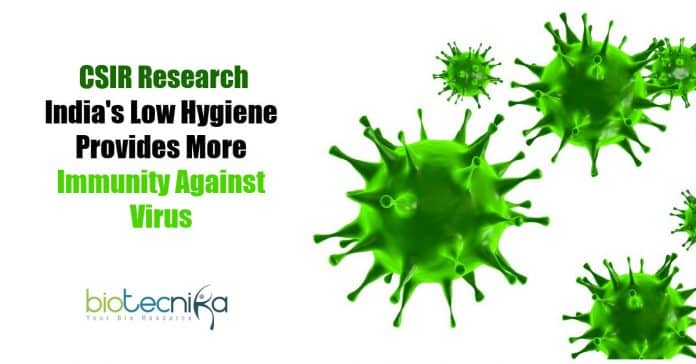India’s low hygiene provides more immunity against virus – CSIR research
New research by the Centre for Scientific and Industrial Research (CSIR) states that less hygiene levels in India have most likely helped Indians battle the COVID-19 pandemic in a better way.
The research states that high parasite and bacterial disease burden in “low and low-middle revenue nations” and persistent exposure to contagious diseases lead to “immune training” amongst the people.
It draws on the immune hypothesis, which specifies that better hygiene and reducing incidence of infections in developed nations have actually given surge to autoimmune disorders and allergies.
Autoimmune disorders are a threat factor in COVID-19 infected people since the body’s own hyperactive immune response produces a cytokine tornado, which is usually the real killer.
The weak negative correlation of COVID-19 LDM with contagious diseases, and its positive correlation with the occurrence of autoimmune disorders in the high GDP nations, is an indicator of the interplay of host immunity and viral infection.
Shekhar Mande, CSIR director-general, and one of the study authors stated that they had evaluated 25 parameters. It appeared paradoxical that people were dying much more in nations with greater GDPs. The reason is that in these
nations, the life span is much higher; they have greater incidences of non-communicable diseases, which are all threat factors for COVID-19 fatality.He further stated that they likewise checked the sanitation levels… There is a hygiene hypothesis that states if you are subjected to various pathogens since childhood, you will be able to deal with them in a much better way. Reduced hygiene suggests extra harmful microbes, and the body’s body immune system is better trained to encounter even with the novel pathogens. It overreacts when that training is not there, leading to cytokine storm, which can turn deadly.
Nations with greater GDP have a greater mortality rate
The research contrasted openly accessible info from 106 nations, including COVID-19 deaths per million, GDP, occurrences of non-communicable diseases like high blood pressure, diabetes, and more, and hygiene data.
The mystery of whether BCG vaccinations – utilized for tuberculosis – have a part to play in the better statistics of any poorer countries was additionally analyzed. However, the research discovered the “negligible correlation” between BCG vaccination and reduced fatality rates.
The research study stated that an intriguing connection between the intensity of COVID-19 results and several non-communicable disorders has actually been noted.
The study noted that since a huge population with these disorders stays in the high HDI (human development index) nations, co-morbidities might have raised as crucial determinants of CFR (case fatality rate) because of COVID-19.
The study stated that individuals over the age of 65 are thought to be at a higher threat, with the percentage of such individuals being dramatically a lot more in the greater HDI nations. Hence, co-morbidities with non-communicable diseases as well as the portion of individuals of more than 65 years, being skewed in the direction of the high-income nations, provide possible answers to the complicated monitoring of CFR dichotomy amongst countries.
India’s low hygiene provides more immunity against virus – CSIR research






























